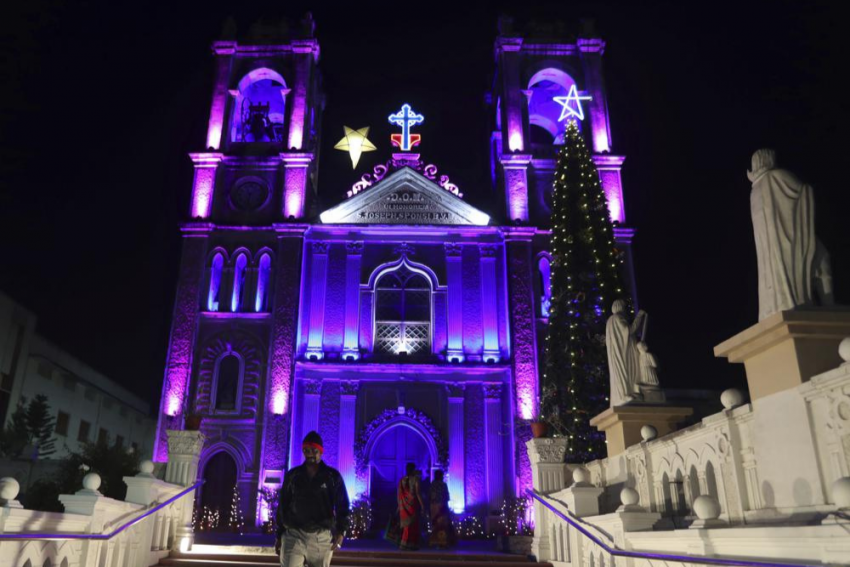For a second year, the surging COVID-19 put a damper on Christmas Eve around the world, forcing churches to cancel or scale back services and disrupting travel plans and family gatherings.
Drummers and bagpipers marched through Bethlehem – the town where Christians believe Jesus was born – to smaller than usual crowds after new Israeli travel restrictions meant to slow the highly contagious omicron variant kept international tourists away.
In Nigeria, the Presidential Committee on COVID-19 restricted gathering of religious worshippers to 50 per cent capacity during the Christmas and New Year celebrations.
In Germany, a line wound halfway around Cologne’s massive cathedral, not for midnight Mass but for vaccinations. The offer of shots was an expression of “care for one’s neighbour” that was consistent with the message of Christmas, cathedral provost Guido Assmann told the DPA news agency.
See More:
- COVID-19 Threatens Crossover Services as FG Limits Gatherings to 50%
- US Army Produces Vaccine Potent against Omicron and COVID Variants
- Covid-19: Biden administration to invest $785m for hardest-hit communities
Around the world, people weary from nearly two years of lockdowns and other restrictions searched for ways to enjoy some of the holiday rituals safely.
“We can’t let the virus take our lives from us when we’re healthy,” said Rosalia Lopes, a retired Portuguese government worker who was doing some last-minute shopping in the coastal town of Cascais.
She said she and her family were exhausted by the pandemic and determined to go ahead with their celebrations with the help of vaccines and booster shots, rapid home tests and mask-wearing in public. She planned a traditional Portuguese Christmas Eve dinner of baked cod.
Across the Atlantic in New York City, where omicron has spread widely, people waited in long lines to get tested, many doing so as a precaution before travelling to reunite with family.
But holiday travel was dealt a blow when major airlines cancelled hundreds of flights, in part because of staff shortages largely tied to omicron.
In Britain, where the coronavirus variant is ripping through the population, some houses of worship hoped to press on.
At St Paul’s Old Ford, an Anglican church in East London, priests planned to hold services on Christmas Eve and Christmas Day. But to protect parishioners, the church called off its Nativity play.
“You might have to cancel the service, but you can’t cancel Christmas,’’ said the Reverend April Keech, an associate priest. “You can’t stop love. Love still stands.”
Numerous churches in the US canceled in-person services, including Washington National Cathedral in the nation’s capital and historic Old South Church in Boston. Others planned outdoor celebrations or a mix of online and in-person worship.
In Germany, churchgoers faced a thicket of health restrictions and limits on attendance. Some had to show proof of vaccination or testing.
Frankfurt’s cathedral, which can hold 1200 people, offered only 137 socially distanced spaces, all of which were booked days in advance. Singing was allowed only through masks.
People in the Netherlands tried to make the best of the holiday, despite living under one of the strictest lockdowns in Europe. All nonessential shops were closed, including bars and restaurants, and home visits were limited to two people per day, four on Christmas.
In France, some visited loved ones in the hospital. In the Mediterranean city of Marseille, the intensive care unit at La Timone Hospital has been taking in more and more Covid-19 patients in recent days.
Amelie Khayat has been paying daily visits to her husband, Ludo, 41, who is recovering from spending 24 days in a coma and on a breathing machine.
They touched their heads together as she sat on his bed, and now that he is strong enough to stand, he got up to give her a farewell hug, as a medical worker put final decorations on the ICU Christmas tree.
In Antwerp, Belgium, Christmas trees hung upside down from windows in a protest against the closing of cultural venues.
In Bethlehem, the scene was much more festive than it was a year ago, when musicians marched through empty streets. This year, hundreds of people gathered in Manger Square as bagpipe-and-drum units streamed through.
Before the pandemic, Bethlehem would host thousands of Christian pilgrims from around the world. The lack of visitors has hit the city’s hotels, restaurants and gift shops especially hard.
(Stuff)

